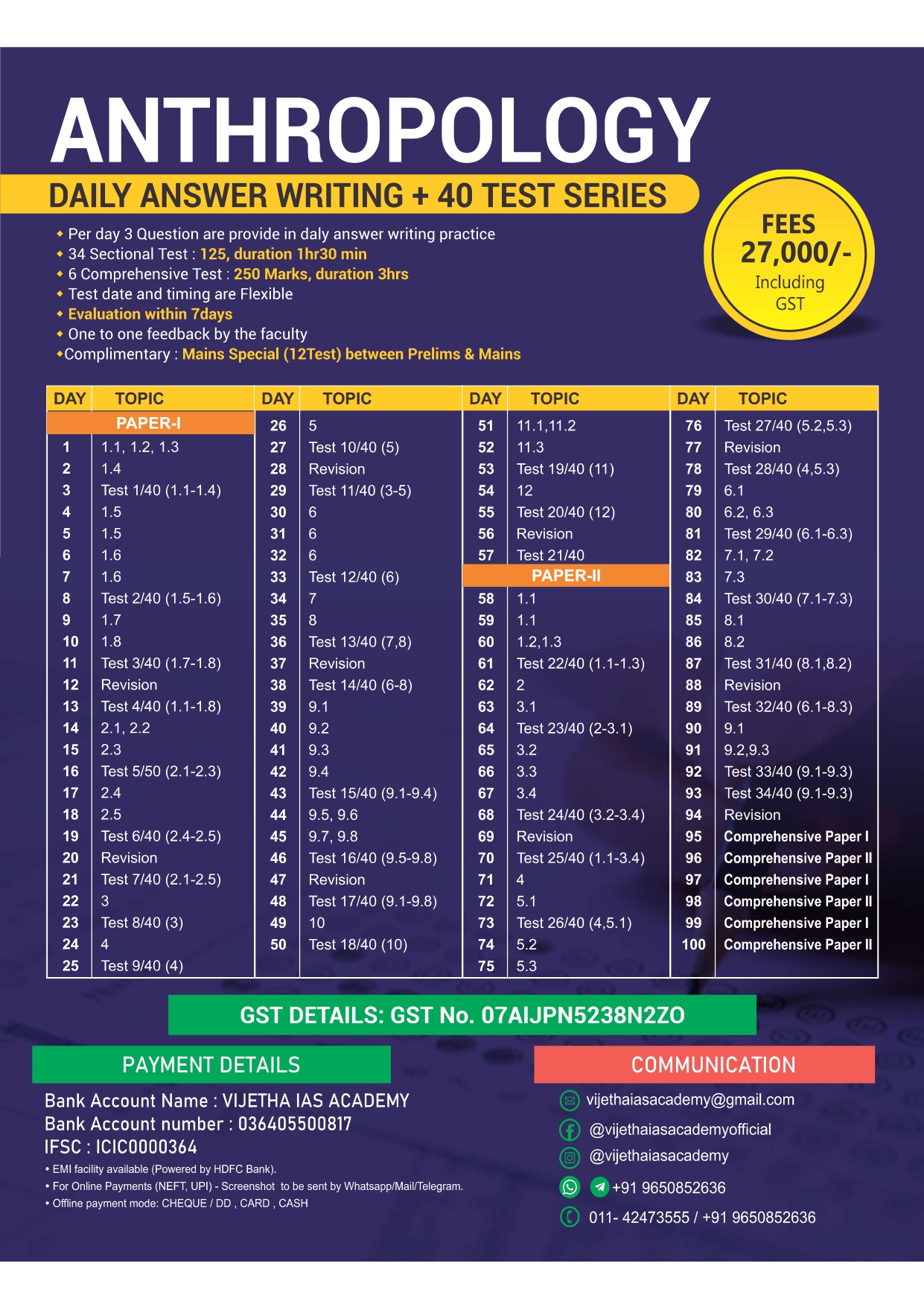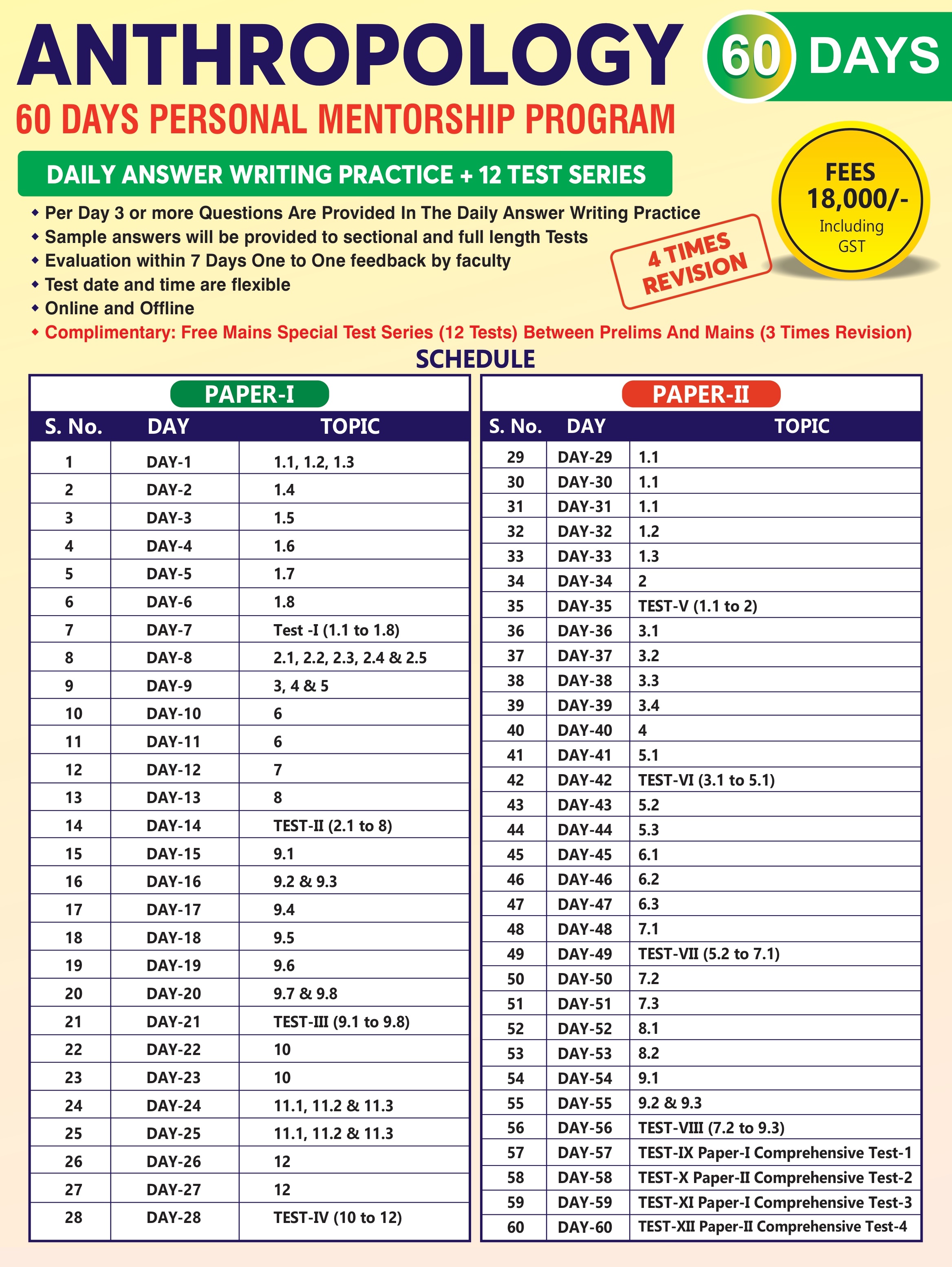
Distinguish a “Theocratic State’ from a secular, liberal, democratic state. Illustrate your answer with examples from tribal and contemporary societies.
(15 Marks) Anthropology Optional Paper CSE 2024
Introduction
A theocratic state and a secular, liberal, democratic state represent two contrasting forms of governance based on the role of religion in political and social affairs. A theocratic state is one where the government is based on religious principles, with religious leaders holding political power or having significant influence on laws and governance. On the other hand, a secular, liberal, democratic state separates religion from politics, promoting individual freedoms, the rule of law, and democratic representation. These two systems offer different approaches to governance, law-making, and social control, and have varied impacts on their citizens.
Main Body
Theocratic State:
Definition:
A theocratic state is governed by religious laws and principles, where the state and religion are intertwined. Political authority is often vested in religious leaders, and religious texts or doctrines serve as the foundation for legal and administrative systems.
Key Features:
Religious Law as State Law: In a theocratic state, religious law (e.g., Sharia law in some Islamic states) serves as the basis for civil and criminal codes.
Religious Authority:
Leaders in a theocracy often claim divine sanction for their authority, and religious institutions wield significant power over both governance and public life.
Limited Religious Freedom:
Theocratic states tend to limit religious freedom and suppress religious diversity, enforcing adherence to the state religion.
Examples:
Iran is a prominent example of a theocratic state where the Supreme Leader has ultimate authority, and Islamic law forms the basis of governance. In Saudi Arabia, Islamic law and clerical power heavily influence both domestic and foreign policy.
In tribal societies, some indigenous groups follow theocratic governance in which religious leaders or shamans hold decision-making power based on spiritual and traditional beliefs, often dictating moral and legal norms within the tribe.
Secular, Liberal, Democratic State:
Definition:
A secular, liberal, democratic state is founded on the principles of secularism, where the state maintains neutrality toward religion, ensuring that no religion is given preference. It promotes individual liberties, democratic representation, and the rule of law without religious influence.
Key Features:
Separation of Religion and State: The state does not endorse any religion, and religious institutions do not interfere in governance. Laws are based on constitutional frameworks and human rights principles, not religious texts.
Democratic Governance:
Citizens participate in free and fair elections to choose representatives, and laws are created through democratic processes that respect pluralism and diversity.
Religious Freedom: Secular states guarantee the right to freedom of religion, allowing individuals to practice any religion or none at all without state intervention.
Examples:
India, though culturally diverse with strong religious traditions, is a constitutionally secular state. The Indian Constitution guarantees religious freedom and the separation of religion from state affairs. While religious groups influence civil society, laws are framed based on constitutional principles rather than religious doctrine.
The United States is another example of a secular, liberal democracy where the First Amendment ensures that the government cannot promote or hinder religious practices, thereby promoting religious freedom and pluralism.
Comparison with Tribal Societies:
In some tribal societies, governance blends theocratic elements with community-based systems. For instance, among the Zuni and other Native American tribes, religious leaders hold spiritual authority and are involved in guiding decisions about community welfare. However, such systems are often more fluid compared to state-level theocracies, with collective decision-making and customary laws also playing a role.
Democratic Tribal Societies:
Some tribal societies, such as the Iroquois Confederacy, practised a form of democratic governance where decisions were made through consensus and deliberation among various clan leaders, reflecting an early form of democratic representation without religious dominance in governance.
Challenges and Criticism:
Theocratic States: While theocratic states claim to uphold moral values based on religious teachings, they often face criticism for violating human rights, particularly in areas of gender equality, freedom of expre0ssion, and religious tolerance. Women, minorities, and dissenters in such states often face significant restrictions.
Secular, Liberal States:
Secular states are often challenged by religious communities that feel alienated or marginalized when state policies conflict with religious values. For example, debates around same-sex marriage or abortion rights often provoke resistance from religious groups, even in secular, liberal democracies.
Conclusion
A theocratic state and a secular, liberal, democratic state represent two different models of governance with contrasting approaches to the role of religion in public life. While theocratic states integrate religion into governance, often at the cost of individual freedoms and religious pluralism, secular, liberal democracies strive to balance religious freedom, individual rights, and democratic governance. Examining these differences, particularly in the context of both tribal societies and contemporary states, highlights the diverse ways in which religion, governance, and society interact across cultures and political systems.
Anthropology Test Series Programme (Online + Offline))
We provide Anthropology Daily Answer Writing a range of programs designed to cater to various stages of UPSC preparation. Whether you're just starting out, have attempted the Mains before, or are getting ready for Mains 2024, we have the right option for you. Allow us to assist you in choosing the course that best fits your needs.
|
Level of Preparation |
Test Series Program |
Test Series Content |
Test Schedule |
|
Self-study of Anthropology Optional |
Anthropology 100 Days Personal Mentorship Program |
Daily answer writing, 34 sectional tests, 6 comprehensive tests, and complementary Mains Special 12 tests (between prelims and mains) |
|
|
Revise whole syllabus through Daily Answer Writing Practice and Tests |
Anthropology DAW Mentorship Program |
Daily Answer Writing Practice and 8 sectional and 4 Full Length tests |
|
|
Revise whole syllabus through Sectional and Full Length Tests |
Anthropology Tier- I T-40 Test Series |
34 Sectionals and 6 Full Length Tests |
|
|
Written Mains earlier and need more practice |
16-Anthropology Tier II Test Series |
10 sectional and 6 Full-Length Tests. |
|
|
Cleared Prelims 2023 and are preparing for Mains 2023 |
Mains Special 12 Tests program |
8 Sectional and 4 Full-Length Tests |
ANTHROPOLOGY MAINS SPECIAL COURSES
Enroll in our Anthropology Mentorship Program today and take the first step towards achieving your UPSC goals!
1) If you are going for Self study of Anthropology Optional and looking for a Comprehensive Program that includes Daily Answer Writing, 34 Sectional tests, 6 Comprehensive tests, and Complementary mains special 12 tests (between prelims and mains), our Anthropology 100 Days Personal Mentorship Program is the perfect choice.
2) If you want to revise Whole Syllabus through Daily Answer Writing Practice and 8 sectional and 4 full length tests, then our Anthropology DAW Mentorship Program is the best fit for you.
3) If you want to revise Whole Syllabus through 34 Sectionals and 6 Full Length Tests then Anthropology Tier- I T-40 Test Series is for you.
4) If you have written Mains earlier and need more practice, then our 16-Anthropology Tier II Test Series is a great option. This test series includes 10 sectional and 6 full-length tests.
5) if you have cleared Prelims 2023 and are preparing for Mains 2023,our Mains Special 12 Tests program is a must-have. This program includes 8 sectional and 4 full-length tests to help you prepare for the big day.
For more information on Vijetha IAS Academy’s Anthropology mentorship programs Deatils : https://vijethaiasacademy.com/anthropology-test-series
Anthropology 100 Days Personal Mentorship Program ( 7 + 3 Times Revision )

Anthropology 60 Days Personal Mentorship Program ( 4 + 3 Times Revision )

For more information: https://vijethaiasacademy.com/anthropology-test-series
Details Of Anthropology Classes Program
Top Anthropology Optional IAS Coaching Center in Delhi Vijetha IAS Academy | Best Anthropology Optional IAS Coaching in Delhi
Fee Structure:
- Tier 1: Rs. 55,150/- (3 Years Validity of Offline/Live Batch)
- Tier 2: Rs. 42,000/-
- Tier 3: Rs. 36,000/-
Batch Size: 50 – 60 Students
UPSC Notes
Anthropology Optional IAS Coaching Notes, IAS Exam Preparation Booklets, IAS optional coaching Notes, UPSC Coaching Notes, Video Lectures, Live Classes with faculty, Chat Facility Available
Teachers Name: N P Kishore Sir
Past Result
- Last Years Result 2023
- 35 Total Selections in CSE 2023
Google Reviews: 4.9 out of 5 stars
Website: Vijetha Anthropology Optional IAS Coaching in Delhi (https://vijethaiasacademy.com)
Faculties of Vijetha IAS Academy
- N P Kishore Sir
Features
- Vijetha IAS Academy offers Online and offline Courses for better preparation of Anthropology Optional Strategy for UPSC in Delhi.
- For better Anthropology optional Exam Preparation, Vijetha IAS Academy Delhi Conducts the Motivational IAS Session.
- Vijetha IAS Academy provides you with the CASE STUDIES on the pattern of the real-time IAS Exam which is helpful for better preparation of the Best Coaching for UPSC Anthropology Optional Optional IAS Examination.
- DAW & WAW – Revision Through Daily & Weekly Answer Writing Practice is offered by Vijetha IAS Academy for better result of the Anthropology Optional IAS examination.
Advantages of joining Vijetha IAS Academy
- Best Faculties for Anthropology Optional IAS Coaching in Delhi
- Best facilities, infrastructure and updated Case Studies Booklets and Notes for better preparation of the Anthropology Optional IAS Examination in Delhi.
- Best result in Past years for Anthropology Optional Strategy for UPSC Examination in Delhi
- Best Rated coaching institute for Anthropology Optional IAS Examination in Delhi.
- Vijetha IAS Academy also provides recorded lectures videos, notes which is very helpful for better preparation of Anthropology Optional IAS Coaching in Delhi
Fees Structure of Vijetha IAS Academy
|
Tier 2 |
Tier 1 |
Tier 3 |
BATCH STARTS FROM |
|
42,000/- |
55,150/- (3 Years Validity Offline/Live Batch) |
36,000/- |
REGISTRATION – START |
Fees Structure of Vijetha IAS Academy
|
Course Name |
Fees Amount |
Course Duration |
|
GS Offline (Pre + Mains+ CSAT) with Essay+Answer Writing |
Rs.99,000 (Including GST) |
400+ Days |
|
GS Online |
Rs.18,999 (Including GST) |
400+ Days |
|
GS Mentorship Programme |
Rs.29,999 (Including GST) |
1 Year |
For more information on our courses, visit our Anthropology Courses page. Explore our Test Series and Online Courses for flexible learning options.
Vijetha IAS Academy
Add. 2nd Floor, 50, Shankar Road, Block 7, Old Rajinder Nagar, Rajinder Nagar, New Delhi, Delhi 110060
MOB. 096508 52636
Open 7 Am : Closes 9 PM
Keywords:
theocratic state, secular state, liberal democracy, anthropology 2024 question paper, Anthropology optional subject question paper 2024, Anthropology optional 2024 question paper, Anthropology Optional Coaching UPSC, Vijetha IAS Academy Anthropology, Anthropology crash course UPSC, Anthropology daily answer writing UPSC, Kishore sir Anthropology
